- Home
- Suzanne Selfors
Mad Love Page 19
Mad Love Read online
Page 19
“Your mother may be the Queen of Romance, but you, Alice Amorous, are the Queen of Denial.”
The bus stopped on our block. I hurried down the aisle and out the door. Errol didn’t call after me as I ran up the front steps. Oscar the cat meowed from one of the geranium pots. Fairy dust, I thought. Sparkles like fairy dust.
Once inside my apartment, I bolted the door. Then I grabbed the photo box from my mother’s room and poured its contents onto the carpet. Searching frantically through the pile, I found a photo taken three years ago when I was thirteen and home for spring break. It was a book signing at an annual romance convention near the airport. My mother sat at a table, pen in hand. I stood next to her, a tight smile stuck on my face. I’d had to wake Mom that morning and help her get dressed. I’d been the one to make the coffee and to call the taxi. We’d arrived late but the readers hadn’t cared. My mother had forced herself to focus during the signing, as she always did. She’d put on a great show as the beautiful, confident, successful writer. No one had suspected that just the night before, she’d stumbled in after disappearing for three days.
I searched the pile again until I found what I was looking for. The event was a gardening club luncheon. My mother sat with a group of ladies, each adorned with a sherbet-colored floppy hat and white gloves. Three-year-old me, in a strawberry-patterned dress, my hair in pigtails and red ribbons, sat on Mom’s lap. Though many years had passed, I held a single memory from that luncheon. But it wasn’t of the food I’d eaten, or the perfumes I’d smelled, or the conversations I’d heard. It was the way my mother had sparkled.
Holding the photo in both hands, I stared at my little happy face, a plate of chocolate cake at my side, a smudge of chocolate at the corners of my mouth. My mother’s smile was equally cheery, her arm wrapped around my waist. A moment of pure happiness caught on a piece of paper. The moment lifted off the paper and caressed me. When I was little it always felt that way.
And there it was, floating behind my mother’s head—a shimmering halo of fairy dust.
The apartment phone rang. The answering machine bleeped and Mrs. Bobot’s cheerful voice skipped into the bedroom. “Alice? I called the hospital and the nurse told me that you’d left and that your friend was doing fine. Come up as soon as you get back. There are plenty of picnic leftovers for dinner.”
“Alice.” Realm’s voice interrupted. “Hey, I want those letters tomorrow. You know what I mean. I want to mail them on Monday morning.”
Then Mrs. Bobot’s voice returned. “Oh, I meant to tell you, I picked up a new pack of tarot cards on the way home and you’ll never guess what happened. Brand new, sealed and everything. It was even a different manufacturer and guess what? I opened them when we got back and they’re all Cupids. Cupids! Isn’t that odd?” The machine beeped and stopped recording.
I stumbled to the bathroom mirror. The same green eyes and narrow nose and pierced ears greeted me. And there it was, the orange glow all around my head.
What does a person do when confronted with a situation that is either madness or magic? Madness was what I most feared and magic was what I’d never considered.
For to consider magic would be, well, madness.
Both photos clutched in my hand, I tore up the stairs.
Errol’s apartment was filled with pink flowers, bursting from vases of all shapes and sizes. A tablecloth had been laid, with candles in silver holders and china plates. A bowl of olives, another bowl of figs, and a bottle of red wine sat on the counter. His bedroom door was open, the curtains drawn. He sat hunched over his desk, writing. “Errol?” I pleaded.
He said nothing.
I inched into the room. “Errol? Would you look at this photo and tell me what you see?” I placed the photo on the edge of his desk, the one of my thirteen-year-old self and my mother at the romance convention.
Errol stopped writing. “I see you and a woman and a bunch of books.”
“Do you see anything else?”
“A table, a wall, an electrical socket, a bottle of water.” He started writing again.
I set a second photo on the desk, the one of my three-year-old self at the garden party. “What do you see in this photo?”
“Do you really want me to answer that question? Because you’re not going to like the answer.”
I swallowed. “Answer it. Tell me the truth.”
“There is no truth, Alice. There is only perception.”
“Please. Tell me exactly what you see.”
The pen slipped from his fingers and he picked up the photo. “I see a group of women at some sort of party. They’re dressed up with hats and gloves. There’s a little girl and she’s smiling.”
“Do you see anything … else?”
“Of course I see something else, but you don’t believe in something else, do you, Alice?”
I tried to stop my lower lip from trembling. “Please, Errol, please tell me what you see.”
He slid a finger over the photo, pointing with a ragged nail. “I see a mother’s aura behind this woman’s head. Some of the sparkles have fallen here.” He pointed to my mother’s napkin. “And here.” He pointed to my mother’s bare arms. “But most have fallen here.” He pointed to my little head. “There’s an aura around the girl too. Silver and white. Very pure. There are rays jutting out from her aura.”
My shoulders began to tremble.
Errol’s finger moved along one of the rays. “Each of the girl’s rays wraps around the woman. Like a hug.”
I sank onto the bare mattress and curled my arms around my legs.
“I take it you see the exact same thing?”
I nodded.
“Well, now we’re getting somewhere.” Errol pushed his stool away from the desk. Then he leaned over me, his forearms resting on his knees. “It’s a rare gift, seeing auras. I was able to do it even before I signed my contract of servitude. That’s why the gods chose me.” He paused, then sat up straight. “Do you know what this means, Alice?”
I had absolutely no idea what anything meant anymore.
“It means that the gods have remembered me.” He rose to his feet. “You’re the proof. I didn’t choose you after all. They chose you.” His voice grew loud with excitement. “I was worried that I’d made a mistake, that I’d wasted time with you, Alice. That I was only thinking about how much you looked like Psyche, and how much I loved just looking at you. But it wasn’t a mistake. The gods led me to you because they knew you were the perfect person to write my story. They heard me when I prayed to them, when I told them I wanted only one thing before I died—to tell my true story. After all this time, they’re letting me tell it.”
“Why would they do that?”
“Maybe they feel some sense of guilt for leaving me behind. Who knows? They’re totally unpredictable and most everything they do baffles me.” Then he nearly blinded me with a joyful smile. “But they found you, a girl who can see auras, a girl who can see love. You are their gift to me before I die.” For a moment he didn’t look sick. Happiness filled his eyes and masked the dark shadows in his face.
“But Cupid can’t die,” I said.
“Why not?”
“Because that would be like having Santa Claus die.”
“That’s ridiculous. Santa Claus isn’t real.” He walked over to the wall and leaned against it. As his smile faded the sickness crept back, silent as a spider, taking its place beneath his eyes and in the hollows of his cheeks. “I’m useless here. I served the gods, not mortals. Mortals fall in love on their own. They screw up their marriages on their own and make fools of themselves on their own. But now my contract has expired. It’s all over. I’m almost done.”
Still sitting on the mattress, I hugged my knees. “Oh my God, Errol. I don’t understand any of this.”
“The only thing you need to understand is that you’ve come face-to-face with your destiny. You can see love. You’re destined to be the greatest romance writer ever.”
“But I don�
��t see love. I’ve only seen it a few times.”
“You’re not going to see it if you don’t want to. You have to be in the right frame of mind, which means you can’t be ruled by fear.” He held out the photo of three-year-old me. “Look. This little girl used to have a brilliant aura.” He held out the photo of older me. “But then it disappeared. At some point she cut love out of her life.”
“That’s not true.” Anger surged through my entire body but I didn’t move. “People stopped loving me. I never stopped loving them.”
“People? What people?” He pointed to my mother. “This person?”
His question invaded me. It pierced a deep, private place. No one had a right to go there. No one. It was MY place and only my place. My breathing grew shallow as I glared up at him, furious that he dared to question my feelings. His eyes widened. “Alice?”
I started to cry. A good cry, the kind where your mind just shuts off and the rhythm of it takes over, and everything gets salty and blurry. Errol sank onto the mattress. He wrapped his arms around me and held me to his chest. A bitter scent of medicine clung to his breath. “Alice,” he said softly, “here is something most people never understand. If you believe that you are unlovable, then all the Valentine’s Day cards and boxes of chocolates in the world won’t do a damn bit of good. But if you believe that you are lovable, then your aura is only limited to every conceivable color in the universe.” Then he sighed. “It really disgusts me how much I sound like a Hallmark card right now.”
“I’m tired of being worried all the time,” I said. “I’m tired of feeling sad.”
“Me too.” His words sank to the floor, heavy with truth. Then we pulled out of the hug. He wiped my eyes with his sleeve. The crevasses around his own eyes had deepened. Some people call themselves old souls. Looking into Errol’s eyes, right at that moment, I knew I was in the presence of one.
“You’re Cupid,” I said. It was a moment of pure awe and it filled me like a long drink of cool water on a scorched day. “You’re Cupid,” I whispered, a little shiver running across my shoulders. “Cupid.”
He wove his fingers through mine. “You look so much like Psyche, it breaks my heart.”
“Would you please tell me the rest of the story?”
His fingers slipped from mine. Then he groaned, wrapped his arms around his stomach, and fell back onto the mattress.
“Errol!” I cried. Grimacing, he pointed to the brown pill container on his desk. Grabbing the bottle, I tore off the cap and shook a pill into his hand. He swallowed it. I grabbed the water bottle and he took a long drink. “Errol? Should I call 911?”
“No,” he whispered. “Don’t worry, it’s not time yet. But it’s getting closer.”
“Closer?” I grabbed his arm. “How close?”
He squeezed his eyes shut. “I can’t tell you the end of the story, not yet. I need to rest. Use the notes. The notes will guide you. Everything’s there. Go.”
I pushed a pillow under his head. “Are you sure? Shouldn’t I call the doctor?”
“I don’t want a doctor. I don’t want any more doctors. Go. Write as much as you can. Use my notes.”
This time I didn’t care that he was giving me orders. I believed. I knew who he was and I knew what I had to do.
I ran back to my apartment. As I skidded to a stop at my kitchen table, I reached for the manila envelope—the envelope stuffed with notes, the envelope given to me at Elliott Bay Books, before I knew Errol, before I believed in Roman gods or auras or even in myself.
But the envelope was not there.
The air whispered.
During the night, a writhing mass of storm clouds gathered over the Pacific and headed our way. In Cal Anderson Park, no suffocating heat greeted the morning dog walkers. No brightness blinded the joggers. The ice cream vendors slept in. “Relief on the Way,” the Seattle Times announced.
Noting the shift in the weather, Archibald Wattles ended his Hawaiian shirt spree. He stood in the foyer in a crisp linen shirt and a pair of jeans, a whisk in his hands. He always made his gravy ahead of time, then reheated it with drippings from the roast just before serving Sunday dinner. “Wanda, you look gorgeous,” he said as Mrs. Bobot twirled two times, the ruffle at her dress’s hem rippling. She’d matched the royal blue dress with a pair of royal blue shoes.
“I made it,” she said.
“I don’t suppose you know that blue is William’s favorite color?” Archibald asked slyly. Mrs. Bobot blushed.
I listened to the conversation while crouched behind my apartment door, peering through a crack barely big enough to notice.
“What’s that?” Archibald pointed to a china plate that Mrs. Bobot held.
“It’s a chocolate cake. To eat after the sermon.” She’d covered the cake with black-and-white chocolate curls. “I used a recipe this time.”
“An actual recipe?” Archibald chuckled. “I don’t suppose you know that chocolate cake is William’s favorite?”
“Is it?” Her feigned astonishment wouldn’t have fooled anyone.
“We’re going to be late!” the reverend announced as he limped into the foyer. His reverend’s collar sat stiffly in place. One hand gripped his cane, the other clutched some papers.
“Break a leg,” Archibald said.
“That’s a ridiculous saying,” Reverend Ruttles complained. He always stayed up late when writing a sermon, which made him grumpy. “Come on, come on,” he insisted, shuffling toward the back door, his cane tapping an anxious rhythm.
“William? Did you see Wanda’s new dress?” Archibald asked.
“I don’t have time for dresses. Let’s go or I’ll be late.”
Though she was sixty-two years old, Mrs. Bobot suddenly looked like a little girl as disappointment spread across her face.
“What about the nice cake she baked? Did you see—?”
“No time for cakes!”
“Wanda?” Archibald reached out to touch her arm but she shook her head. Then she handed him the cake.
“No matter,” she said, composing herself. “You sure you won’t join us?”
Archibald smiled sadly. “Maybe someday.”
Then the person I was waiting for tramped down the stairs, her headphones protecting her from any cheerful morning conversation that might drift her way. I narrowed my eyes like a cat, wanting to hiss at her. “The weather guy said there’s a huge storm coming. Isn’t that freaky?” Realm said. “First a heat wave, now a storm.”
“A storm in July,” Mrs. Bobot said. “What a strange summer.”
I waited until Realm had followed her grandmother out the back door. When I heard the car engine start, I ran into the foyer.
“Alice?” Archibald said. “You’d better hurry. They’re in the car already.”
“Mrs. Bobot knows I’m not going.” I peered out the back door to make sure Mrs. Bobot’s car was pulling away, with Realm in it. “Archibald, you still haven’t found that manila envelope, have you?”
“Not since the last time you asked. Which, in case you don’t remember, was two a.m.”
I’d been up most of the night, desperately searching. I’d asked Errol if he had the notes. “Of course I don’t,” he said. “Now please, Alice. Let me get some rest.”
“But, Errol, I can’t find them.”
“You have to find them,” he mumbled from the darkness of his room. “You must find them.”
I’d told Archibald, Mrs. Bobot, and Realm about the envelope. I’d explained that the notes belonged to Errol and that they were for a book we were writing together. I’d pleaded for help because Errol was dying of cancer and there were no copies of his notes. Mrs. Bobot promised to look for the notes, as did Archibald. Realm made a snippy comment about how everyone else’s book was more important than her book. Reverend Ruttles told everyone to be quiet because he still had a sermon to write. At some point, after searching and searching, I collapsed on the couch and fell into a deep sleep.
“I’m sor
ry to hear that the envelope is still missing,” Archibald said. Then he sniffed. “Uh-oh. Something’s burning.” Brandishing the whisk, he raced into his apartment.
I tightened my fingers around the key I’d been holding. Up the stairs I flew, two steps at a time. Because my mother was the landlord, a key to each apartment was kept in a bowl in our kitchen. Throughout the night, I’d gone over every possibility. I hadn’t taken the envelope out of the apartment. I hadn’t given it to anyone. The last time I’d seen it, it had been sitting on the kitchen table. And now all that sat there were blank pieces of my mother’s stationery. Someone had taken the envelope and put the stationery in its place.
Someone.
I grabbed Mrs. Bobot’s doorknob and slid the key into the lock. The apartment smelled like pipe tobacco, which meant that Mrs. Bobot had been missing her husband lately. I headed straight to Realm’s room. DO NOT ENTER THE REALM OF REALM, the sign warned.
It didn’t take long to search the room. The place reminded me of a motel, sparse and tidy. Just a few belongings—clothes in the closet, a couple of books by the bed, some products on the dresser. None of Mrs. Bobot’s homespun items had made their way into the Realm of Realm.
When I reached under the bed, my pulse quickened. I pulled out a book, which turned out to be Realm’s journal. Revenge danced through my head. Realm had taken Errol’s notes, I knew that. What better way to get them back? She’d come into my home and had read my private papers. What comes around goes around—wasn’t that the saying?
I opened the journal to its first page and found a glued photo of Realm’s predecessor, Lily. Smiling like the Cheshire cat, Lily sat next to a smiling man and woman, an ice cream cone in her hands. It would have been a nice photo, one that you’d see in most family albums, except that someone had drawn a mustache on Lily’s chunky face and had scratched x’s all over her body. The words I’M SO UGLY were scrawled at her feet. I could sense the sadness contained in each little x. The self-loathing.
That’s when I realized what Realm had done. For so many summers, Lily had come to visit in her sundresses and ribbons. And then one summer, she was gone. She couldn’t be the perfect little girl that her father wanted. By starving herself, covering herself in layers and shearing her hair, Realm had destroyed Lily, sending her into the abyss, just like the day when she’d burned her name.

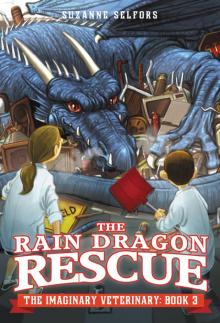 The Rain Dragon Rescue
The Rain Dragon Rescue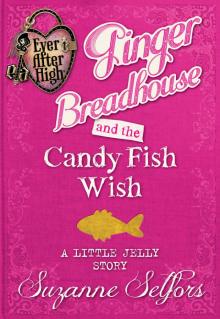 Ginger Breadhouse and the Candy Fish Wish
Ginger Breadhouse and the Candy Fish Wish Ever After High: Lizzie Hearts and the Hedgehog’s Hexcellent Adventure: A Little Shuffle Story
Ever After High: Lizzie Hearts and the Hedgehog’s Hexcellent Adventure: A Little Shuffle Story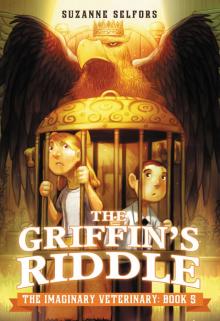 The Griffin's Riddle
The Griffin's Riddle Smells Like Pirates
Smells Like Pirates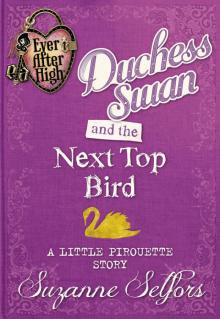 Duchess Swan and the Next Top Bird
Duchess Swan and the Next Top Bird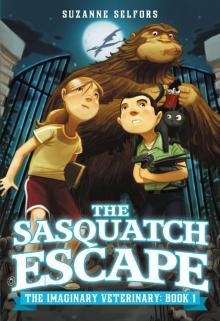 The Sasquatch Escape
The Sasquatch Escape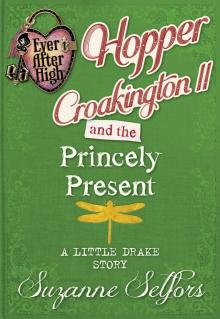 Hopper Croakington II and the Princely Present
Hopper Croakington II and the Princely Present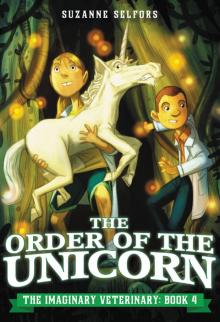 The Order of the Unicorn
The Order of the Unicorn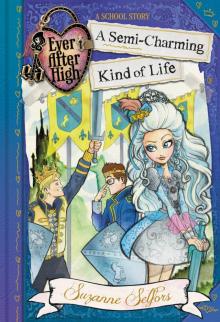 A Semi-Charming Kind of Life
A Semi-Charming Kind of Life Braver
Braver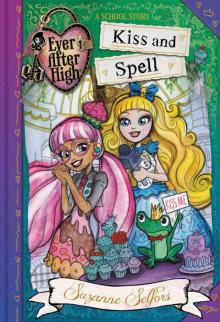 Kiss and Spell
Kiss and Spell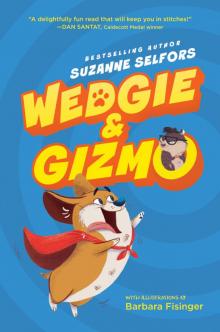 Wedgie & Gizmo
Wedgie & Gizmo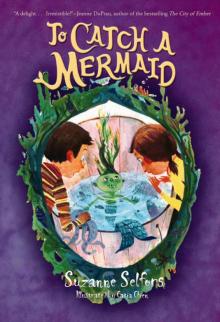 To Catch a Mermaid
To Catch a Mermaid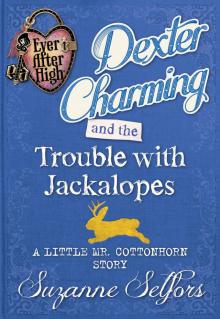 Dexter Charming and the Trouble with Jackalopes
Dexter Charming and the Trouble with Jackalopes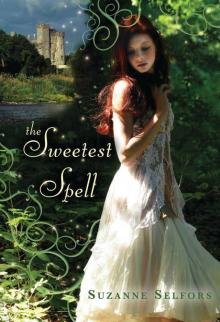 The Sweetest Spell
The Sweetest Spell CoffeeHouse Angel
CoffeeHouse Angel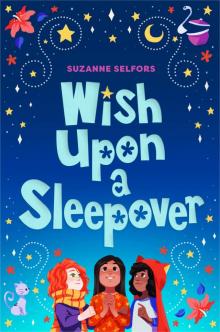 Wish Upon a Sleepover
Wish Upon a Sleepover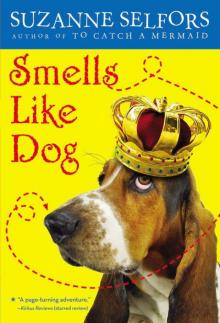 Smells Like Dog
Smells Like Dog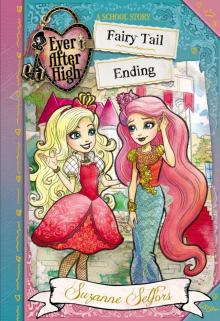 Ever After High
Ever After High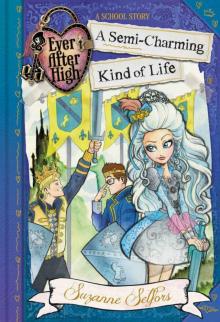 Ever After High: A Semi-Charming Kind of Life
Ever After High: A Semi-Charming Kind of Life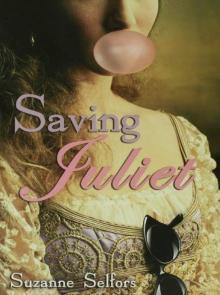 Saving Juliet
Saving Juliet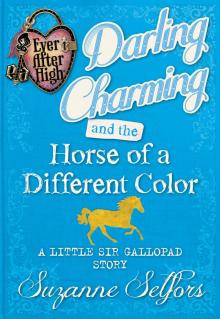 Darling Charming and the Horse of a Different Color
Darling Charming and the Horse of a Different Color Wedgie & Gizmo vs. the Toof
Wedgie & Gizmo vs. the Toof Spirit Riding Free--The Adventure Begins
Spirit Riding Free--The Adventure Begins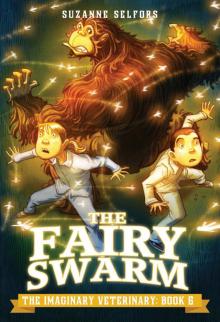 The Fairy Swarm
The Fairy Swarm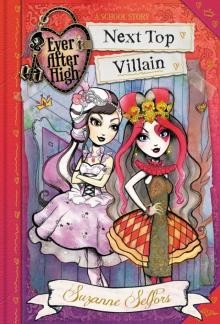 Ever After High: Next Top Villain: A School Story
Ever After High: Next Top Villain: A School Story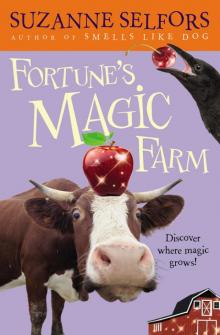 Fortune's Magic Farm
Fortune's Magic Farm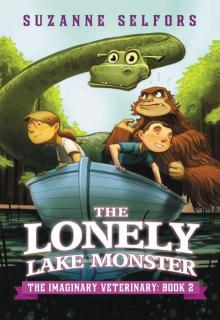 The Lonely Lake Monster
The Lonely Lake Monster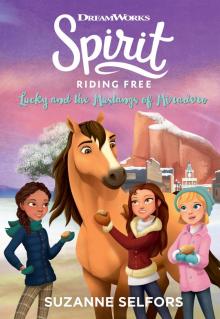 Spirit Riding Free--Lucky and the Mustangs of Miradero
Spirit Riding Free--Lucky and the Mustangs of Miradero Smells Like Treasure
Smells Like Treasure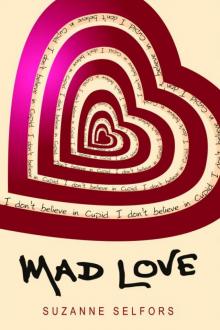 Mad Love
Mad Love